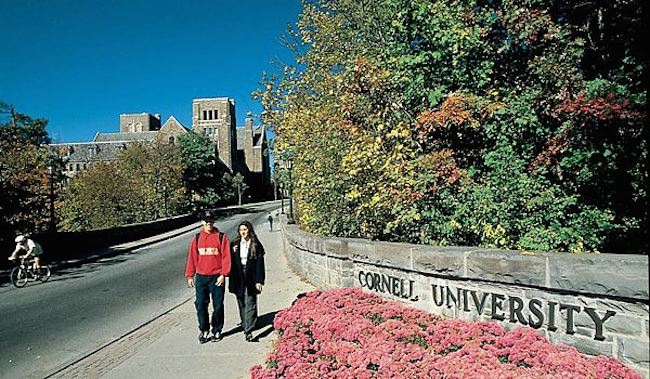Cornell University’s Dyson School of Applied Economics and Management also jumped 16 spots from 2013 to 2014, producing an equal index score to Kelley’s. What’s the secret sauce at Dyson? Specialization. “All students in the program [are required] to take a range of management, economics, applied economics, and quantitative methods courses to ensure a solid business foundation,” writes one student. “From there, students choose to specialize in up to two of ten focus areas. This allows each individual to develop expertise in the field that interests them the most. Business is such a vast area of study, so these specializations really allow the students to narrow their focus and career paths.”
Here are some other schools that improved their academic rankings over 2013: Case Western Reserve University (+30), Binghamton University (+25), the University of Miami (+19), and the University of Denver (+16).
BERKELEY AND VILLANOVA DROP 10 SPOTS
For some schools to move up, others have to drop. And the University of California-Berkeley Haas School of Business experienced the biggest fall, going from No. 2 to No. 12. Haas is dragged down by unhappy students, with the results of student surveys placing the school at No. 51 in that category. Students also gave faculty a B grade on a rubric where 60 schools received A+ or A marks from students. Still, Berkeley is ranked high academically for many reasons. One is a highly competitive student body driven by a faculty that doesn’t accept complacency, says one survey respondent. “Haas provides students with many resources, however, nothing is spoon fed. Students are forced to take initiative, thus creating more leaders within the program.”
The same is true for Villanova University, which also dropped from No. 2 to No. 12. In addition, the school tumbled nine spots on the overall ranking. However, Villanova faculty still earned an A+ grade from students. And that may partially stem from the school’s focus on developing professional skills. Students cited these efforts as particularly helpful in business settings according to Bloomberg Businessweek student surveys. “Villanova has a strong focus on teamwork that I have found to be incredibly useful in the job market,” one student shares. “Classes such as Competitive Effectiveness teach these necessary skills and truly focus on management and cooperation. These are skills that must be learned but are not easy to teach yet somehow Villanova has found a way.”
Berkeley and Villanova weren’t alone in losing ground. Georgetown University and Ohio Northern University each plummeted 20 spots academically – and Boston University followed closely behind by slipping 19 spots. Schools that tumbled out of the top 50 academically in 2014 include: Tulane University, the University of Illinois, American University, Loyola Marymount University, and Bradley University.
BIG DIFFERENCES BETWEEN ACADEMIC AND OVERALL RANKINGS
That said, academic prowess doesn’t necessarily result in higher rankings. Take the University of Denver, for example. Ranked No. 12 academically, the program rates No. 67 overall, pulled down by poor results in student surveys (No. 90), recruiter rankings (No. 88), and feeding MBA programs (No. 120). The program’s teaching (B) and placement (C) grades don’t help either.
However, there were some programs with higher overall rankings than academic ones. Exhibit A: The University of Texas’ McCombs School of Business. Despite ranking No. 6 overall, McCombs is only No. 34 academically, hindered by its high student-to-faculty ratio (20:1) and average SAT entrance scores (1353) that are slightly lower than its peers. Brigham Young, ranked No. 13 overall, only reaches No. 41 academically, with low SAT scores (1246) being the main culprit. You’ll also find big discrepancies between overall rank and academic rank at Texas A&M (29 vs. 102), Penn State (30 vs. 102), and the University of Georgia (48 vs. 115).
However, this year’s rankings featured several clusters. For example, there were 12 programs tied for the No. 12 ranking. Another 10 were bunched up at No. 41 (and that doesn’t count the 13 programs huddled together at No. 71). In other words, the academic gap between many undergraduate programs in Bloomberg Businessweek’s formula isn’t all that wide in many places.
To review school grades and rankings, continue to the next page.
DON’T MISS: HOW STUDENTS RANK THEIR BUSINESS SCHOOLS














Questions about this article? Email us or leave a comment below.